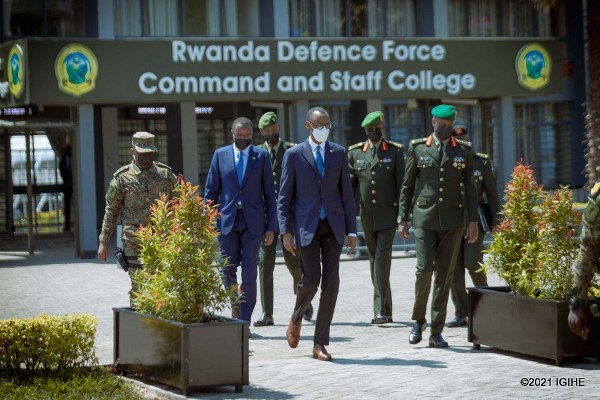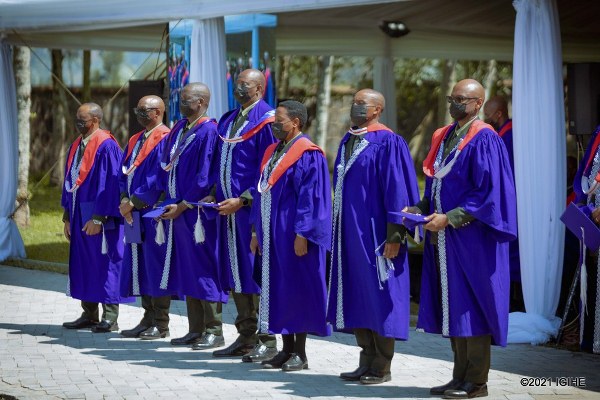
President Kagame yesterday delivered his remark at the 9th RDF Command and Staff College graduation ceremony in Nyakinama, Musanze, and he focused on the complex global challenges Rwandan are facing, from terrorism, to pandemics or natural disasters, and no single country can provide durable solutions. Read below his remark:
I say good afternoon to you. I am pleased to be back in Nyakinama, for this 9th graduation of the Senior Command and Staff Course. I want to start by congratulating all the graduating officers, your families, and the staff of the College for this important achievement.
The continuous acquisition of knowledge and skills, and the training of leaders in all fields, is an important part of Rwanda’s development trajectory.The armed forces are therefore no exception.
The mission of this college is to educate a professional officer corps, to serve our country’s needs and aspirations.
I am pleased to hear of the College’s efforts to modernize, in keeping with global trends.

The 47 officers graduating today, embarked on this course with a clear understanding of the role of the Rwanda Defence Force, as an integral part of our country’s identity and transformation journey.
You all have a part to play in ensuring that we reach our objectives. You have gained even more capabilities from this course, and therefore more is expected of you. I hope you will step into your new roles with fresh insight and enthusiasm.
There are important challenges that require your leadership, as well as constant collaboration with other institutions.
First, we must continue to consolidate the values of trust, consensus, and accountability that characterize our society, and to which our defence and security institutions have always actively contributed.
Second, as 21st century officers, you will operate in a volatile geopolitical and security environment, as part of an ever more inter-connected world.
Inter-connected and unequal as well. Mark my word: unequal.
Therefore it adds another dimension of responsibility. How do we base on this knowledge, and commitment and even limited resources, how can we raise ourselves to that level where we feel we are equal with others. This level where we feel we are equal with others, is loaded with many other things, and it’s also an issue of mindset. It’s an issue of choices we have made or we want to make going forward.
It’s an issue that we have talked about several times in the past and may to talk about it several more times in the future. But my point is it isn’t just about talking, but doing the very things that will take you where you want to be. Let me digress a little bit here to elaborate a few points.
We were talking about modernisation, knowledge, acquiring skills, capabilities in so many fields…I saw something lacking that I thought I needed to mention here to ensure that those responsible will do everything possible so that what has not been happening may happen.
You will agree with me, graduating officers here today, throughout the many weeks you have had here, and many others who were here before you, something was lacking in understanding and utilising IT – Information Technology.
Before I came here I was asking the leaders of the Defence Forces how much that is utilised here to help students make broader studies, and actually learn to use the tools themselves here, as part of the course. The answer was clearly one that I didn’t want to hear.
So from today, going forward, those here responsible for that field, be it the Minister of Defence, leaders of RDF, and education and IT people, when I come back here and find that this hasn’t taken shape as it must, you will be in trouble.
Then for “unequal” I meant, most of us are all associated in one way or another. You have heard people talk about security studies and imagined it was security in a much broader sense, and also when you talked about geopolitics.
Our country, I think we have a good understanding of who we are, where we are, where we are coming from ,and where we are going and want to be.
There is something intriguing, when we are talking about lack of security in some aspects. On the one hand, we work in partnership globally. In that partnership we get a lot of support, work together, we address problems in areas where there is lack of security.
But at the same time, in our relationships, in the way we do business, we find that while on one hand they are helping to deal with matters of security, on the hand they are actually contributing to creating insecurity for countries, including our own.
What do I mean?
Particularly in our case, there have been people who graduated as you have today, who run into problems of their own making, sometimes in fact problems of criminal nature. And the same people run to countries called our partners, tell a lot of lies, and they are welcomed. These same people turn around and actually get involved in acts that create insecurity for the country.
I am saying this because it has more or less become a trend. It doesn’t matter how much time we take to explain, it seems to go on, and on and on, with our partners.
So I am just telling our partners that don’t help to deal with problems of security, meaning helping to build capabilities, and even support development, itself part of broader security, and at the same time give ground for insecurity to develop and that will come and reverse what we have been building together. Meaning our countries, and then with our partners.
So those studies you are talking about, those who undertook security studies, I hope you didn’t just go through it in a traditional sense without bringing it to bear on these realities that you and your countrymen and women go through every day.
It’s interesting because you read books, or write books, you study…I was talking to someone a few days ago, they had been abroad studying. In writing their thesis and things like that, these are Rwandans, when they want to write something about Rwanda, in the context of the course they undertook, the leaders of this course they undertook, the leaders of this course will tell them not to touch it, not to talk to about it, that they look for something else.
The reason you would imagine, would be that you are biased, because that is where you come from. But no, that would be the simpler problem. The one who will mark you or is supervising you can easily point that out and even penalise you for being biased, that’s not a problem.
But the reason is, they have set a narrative about Rwanda, for example, and they don’t want anything deviating from that narrative they have created. If you write something where you give facts, you give evidence, you destroy the narrative. That is not something they would be happy about. That’s why they tell you no, don’t.
When I probed further I found out that it is a common thing, it is not just one incident.
I am bringing this out because when we were talking about geopolitics and broader security studies, I mentioned the interconnectedness of the world but also added how unequal it was because these things lie at the centre of what I am talking about. All these are the elements that actually have to be looked at, if we want to create a world where we are equal.
Equal shouldn’t be just words, it must be demonstrated in real life.
So you officers, don’t just leave this place where you invested all these efforts, and studied hard, without looking at things differently from how they have been looked at for many years, for decades. In fact sometimes things happening today taking us back centuries we have gone through.
I thought I needed to bring this up with you. I could have said much more, but let me keep that for another time.
Here we find ourselves with complex global challenges, from terrorism, to pandemics or natural disasters, where we find no single country can provide durable solutions on its own, no matter how big or well-resourced they are.
You are therefore called upon to look ahead, to assess threats and opportunities, and to collaborate with peers in the region and beyond, in order to address them successfully.
Our Defence Force is already making a difference in several theatres, because we are anchored in a tradition of discipline and duty, while remaining dedicated to the well-being of citizens.
Finally, there is a battlefield beyond the physical one, where RDF must always be ready to protect Rwanda’s security and stability uncompromisingly.
This is the struggle to instill the mindset amongst ourselves, that Rwandans and Africans are as equally deserving as others, in terms of freedom, respect and prosperity. We must be diligent in securing better lives for our people, and contributing to a better world, for all.
I wish to conclude by once again thanking the families and friends who are here to celebrate with the graduates.You have been the support network for our officers, and by extension for our entire Defence Force.
Congratulations, and we wish you all the best, as you continue with your careers in our Defence Force. I thank you for your kind attention. Have a good day. (End)
